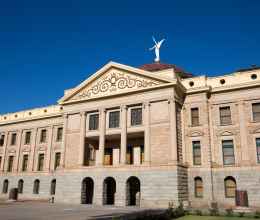
Arizona charter school enrollment policies routinely contain language that discriminates against certain student populations, including students with disabilities
PHOENIX – Hundreds of public charter schools across Arizona have enrollment policies that are unlawful or discriminatory, an ACLU of Arizona investigation released today reveals.
"'School choice' means that families should be choosing schools, not the other way around," said Alessandra Soler, executive director of the ACLU of Arizona. "But Arizona’s charter schools, and the state agencies they’re accountable to, have ignored deeply troubling and sometimes illegal enrollment policies that deny low-income students, English learners, students with disabilities, and other vulnerable student populations, opportunities to attend the schools of their choice."
Out of the 471 charter schools that the ACLU of Arizona was able to analyze, at least 262 (56 percent), have policies that are clear violations of the law or discourage the enrollment of certain students, including students with disabilities, students who struggle academically, students with disciplinary history, and students from immigrant families. For instance, the investigation found six charter schools have an enrollment cap on the number of students with special education needs, which violates federal and state law.
Arizona charter schools operate independently, but they are part of Arizona’s public education system and use taxpayer funds. They must be open to all students. Arizona law makes clear that charter schools must enroll any student unless the school is at capacity or a student has been expelled.
The ACLU of Arizona investigation, “Schools Choosing Students: How Arizona Charter Schools Engage in Illegal and Exclusionary Student Enrollment Practices and How It Should Be Fixed,” revealed that enrollment policies at charter schools frequently stray from these clear legal guidelines:
- At least 59 Arizona charter schools refuse to admit students with prior suspensions or imply that prior suspensions could affect their admission, even though Arizona law only allows students to be denied enrollment at charter schools if they have been expelled;
- At least 88 Arizona charter schools require essays or interviews as part of the enrollment process and do not state that a student’s performance on these activities will not impact their admission;
- At least 46 charter schools require parents to commit to volunteer a certain number of hours, with at least six schools allowing “buyouts” for parents to pay their way out of volunteer commitments, even though volunteer commitments and donations to charter schools must be voluntary; and
- The most commonly spoken language in Arizona other than English is Spanish, yet only 26 percent of Arizona charter schools reviewed (123 schools) provide enrollment documents in both languages.
- Furthermore, 72 Arizona charter schools do not make their enrollment materials available online and did not respond to the ACLU of Arizona’s requests for public records, violating their obligations under the state’s public records law and making it impossible to analyze these schools on most or all enrollment metrics.
“I used to think charter schools accepted all students, regardless of their academic background, and provided them an exceptional education,” said report contributor Danielle Kayfesh, whose son was discouraged from enrolling at a charter school in Queen Creek because of his grades. “Now, I see them as schools that pick and choose which students they want in their classrooms.”
The report makes recommendations for parents and students, charter school operators, charter school authorizers (such as the Arizona State Board for Charter Schools), and the Arizona Department of Education, to improve public charter school enrollment policies. The recommendations suggest the creation of a “common application” for all public charter schools that complies with federal and state laws and does not contain discriminatory language.
“This report should be a wake-up call to Arizona charter schools that they are not fulfilling their ‘school choice’ promise,” Soler said. “Education leaders must act to remove discriminatory barriers to public charter enrollment so that all students have an equal opportunity to attend a charter school if that’s what the student’s family wants.”
The report, Schools Choosing Students, is available online as a PDF and in an HTML version, which has been published in both English and Spanish.
###



